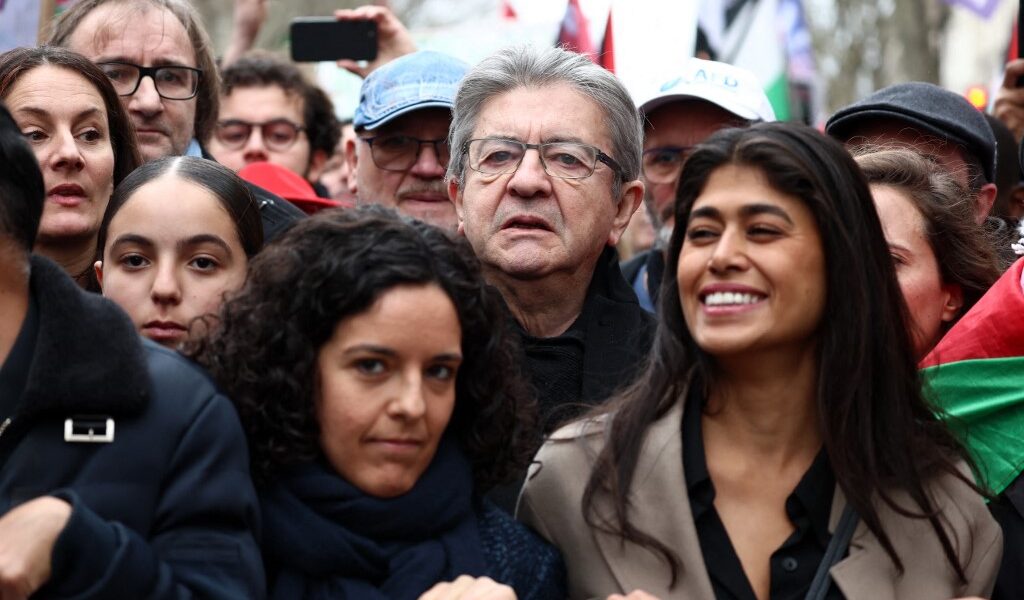EU elections: French in North Africa opt for the left and its pro-Palestine stance

In more than 90 percent of French constituencies, the far-right National Rally (RN) came first in last week’s European elections.
The political reverberations from this prompted President Emmanuel Macron to dissolve the National Assembly and call snap parliamentary elections, which could see the party of Marine Le Pen storm to victory once again.
Yet in North Africa, French citizens cast their ballots another way, mainly voting for the left-wing France Unbowed (LFI) on Sunday.
Overall, the more than 130,000 voters of the ninth constituency (which includes French citizens living in Morocco, Algeria and Tunisia) stayed away from the ballot box altogether: only 13.94 percent of them went to the polls, while the turnout back home in France reached 51.49 percent.
Those that did make their way to consulates in the Maghreb countries voted mostly for the list led by LFI candidate Manon Aubry.
In Algeria, LFI came out on top everywhere (63.32 percent in Algiers, 61.04 in Annaba and 63.5 in Oran), far ahead of Macron’s centre-right Renaissance list (7.45 percent, 9.82 percent and 6.25 percent respectively).
The other candidates scored low, with the RN getting between two and six percent, and the right-wing Republicans between two and four percent.
In Tunis, 54.6 percent of voters chose LFI, far ahead of the Socialist Party (PS) with 11.3 percent of the ballots and Renaissance with 11.1 percent. The Republicans got 2.9 percent of votes and the National Rally’s list led by Jordan Bardella, the big winner of election night in France, won 6.9 percent.
In Morocco, France Unbowed also arrived at the top of the ranking, with 41 percent of the votes: 44.3 in Casablanca, which has the largest number of French voters, 49.7 percent in Fez, 44.9 in Rabat and 48.5 in Tangier.
However, in Marrakech and Agadir, the election was marked by a high vote for the far right. The RN scored 16.4 percent in Marrakech, just behind LFI (17.6 percent) and Renaissance (19.7 percent), while in Agadir, Bardella’s list polled highest, with 22.9 percent.
A ‘Gaza effect’
To explain the success of France Unbowed in the Maghreb, some observers cite the Israeli-Palestinian issue and the Gaza war, which featured in the European campaign.
“Throughout the region, LFI scored high because the Palestinian question is central [there],” Abdelghani Youmni, adviser to French expatriates in Casablanca and member of the Socialist Party, told Le Monde newspaper.
Dual nationals, who account for more than half of the voters, and French people married to locals, seem to have appreciated LFI’s stance on Israel’s war on Gaza.
The party has repeatedly condemned Israeli attacks on Palestinians as “genocide”, prompting accusations of antisemitism, and placed vocal French-Palestinian jurist Rima Hassan in one of the top positions on its list.
Comparisons with LFI results in the previous European elections tend to confirm this analysis, according to Le Monde. In 2019, LFI barely reached 10 percent in Morocco, finishing third, far behind La Republique en marche (LRM, now Renaissance) and Europe Ecology-The Greens (EELV).
“I’m not surprised. Feedback from the field has shown for several weeks that voters in Morocco feel very concerned by what is happening in Gaza. They sent a very clear message,” an EELV member told Le Monde.
But this “Gaza effect”, as Youmni describes it, does not explain everything. Observers also point to the visa crisis that stained relations between France and North African countries.
In September 2021, Macron drastically reduced the number of visas issued to Algerians, Tunisians and Moroccans, justifying the decision by the refusal of the three countries to issue consular passes necessary for the expulsion of illegal immigrants from France.
LFI’s founder Jean-Luc Melenchon was a vocal critic of the move, which angered the Maghreb countries, until it was reversed last November.
The leftist party’s ambiguous stance on the issue of Western Sahara, meanwhile, may also have played a role in the decision of the voters in Morocco and Algeria.
This vast territory, a former Spanish colony, is approximately 80 percent controlled by Morocco but claimed by the Sahrawi separatists of the Polisario Front, who are supported by Algeria. Algeria broke off diplomatic relations with its great regional rival Morocco in 2021, mainly because of this issue.
In October 2023, Melenchon made an official visit to Morocco, where he appeared to back Rabat’s position on Western Sahara.
He suggested that France should rally behind the United States and Israel, which recognised Moroccan sovereignty over the disputed region in exchange for the normalisation of Israel-Morocco relation. The LFI leader said Paris should at least adopt Spain’s position, which considers Morocco’s autonomy plan as “the most serious and credible basis” for a resolution of the conflict.
On the other hand, Aubry, like other LFI leaders such as Mathilde Panot, made several declarations in favour of Polisario.
While the French must return to the ballot box in three weeks, this time to elect a new parliament, early opinion polls suggest a victory of the RN, which is predicted to get around 33 percent of the vote, followed by a united left including LFI and the socialists on 22 percent, and the presidential camp in third position on 18 percent.
Those surveys were conducted before Eric Ciotti, leader of The Republicans, stunned France on Tuesday by announcing he backed an alliance with Le Pen’s party in the snap elections. It is the first time in modern French political history that a leader of a traditional party has backed an alliance with the far right.


